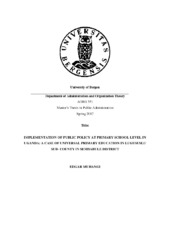Implementation of public policy at primary school level in Uganda: a case of universal primary education in Lugusulu Sub County in Sembabule District
Master thesis
Permanent lenke
https://hdl.handle.net/1956/16029Utgivelsesdato
2017-06-15Metadata
Vis full innførselSamlinger
- Department of Government [473]
Sammendrag
The Government of Uganda's Universal Primary Education policy is the main overlapping policy in the educational sector in the whole country. With implementation of UPE in all 111 districts in the country and one city (the capital city of Kampala), which are grouped in to four administrative regions, and most districts are being named after their main commercial and administrative towns, known as “chief towns”. The Ugandan government thought to increase the accessibility of the population to education services irrespective of one’s gender; disability or any other categorization would modernize the society. It was also assumed that this would reduce high levels of poverty and improve on human development by encouraging every child to enter school. This study focused on universal primary education because it was the oldest educational policy, which meant to give easy accessibility of relevant information about the study. To understand UPE policy implementation in Uganda, the study based on data collected from Lugusulu Sub County in Sembabule District, in terms of accessing free education services as was planned by the Uganda government. The study used qualitative research method which helped to demonstrate a different approach to scholarly inquiry than other methods of quantitative. This study specifically targeted primary public schools both in peri-urban centres and rural areas in Lugusulu sub-county in Sembabule district in Uganda. Therefore, the study used explanatory variables such as policy design, political and socio-economic status and availability of resources for examples, financial and human resources. This study used qualitative research approach because it demonstrates a different approach to scholarly inquire than other methods of quantitative methods. It also relies in the text and image data, have unique steps in data analysis, and draw on diverse designs (Creswell, 2014, p. 183). Therefore, multiple sources of data collection like interviews, FGDs, observation and documents were used to collect relevant empirical evidence for the study. For the research problem study, I decided to be guided by two main theories such as Winter's integrated implementation theory (1990) and Van Meter and Van Horn's implementation theory (1975). This was because these theories argue for some factors which mainly determine the successfulness of implementation process such as design of the policy standards and objectives, policy resources, political and socio-economic status, inclusion of street-level bureaucrats, target-group behaviors, amongst other factors. In this regard these two main theories largely informed the study with the relevant explanatory factors for example, policy standards and objectives, policy resources, and political and socio-economic conditions by analyzing how they affect UPE policy implementation. The study operationalized the explanatory variables, and based on the data that was collected. The study also discovered different problems that largely affected the policy of UPE implementation in Sembabule district local government. Some of the problems discovered during the study include: politicization of UPE policy implementation process, ambiguity of policy standards and objectives amongst various policy actors, inadequate financial and human resources, delayed disbursement of UPE policy funds to the district, corruption amongst policy implementers, poverty amongst the population, ignorance of the parents about education results, lack of proper budget control by local governments, illiteracy amongst the population, inconsistences amongst the policy actors, early pregnancies and marriages, lack of enough social amenities, poor geographic environment, traditional diseases amongst other problem. After data collection, the study concluded that, for the UPE policy to be successfully implemented in Lugusulu sub county in Sembabule district, policy implementers should maintain clear policy standards and objectives, ensure available policy resources such as financial and human resources, ensure good political and socio-economic status of the community, better social amenities such as good hospitals, roads, water, electricity, availability of classrooms, ensure proper budget control of the funds, sensitization of the public about the advantages of educating the children, sensitization of the public about the dangers of early marriages and pregnancies, train district officers in managing the resource flows, improve management by training head teachers in management, leadership skills, and train community leaders, amongst other solutions for the successful policy implementation. Therefore, the study managed to detail the findings extensively in different chapters of the study.
